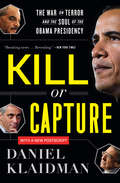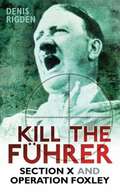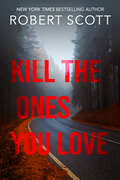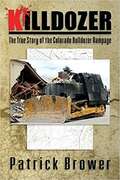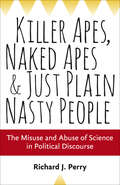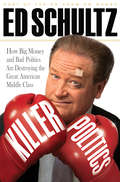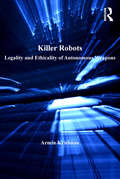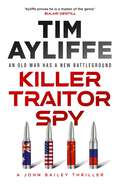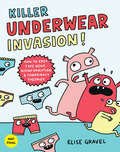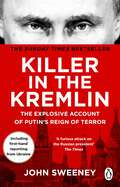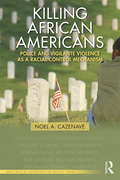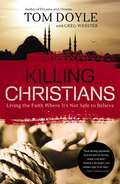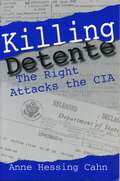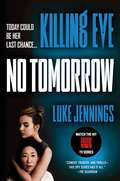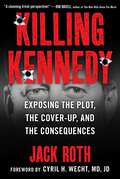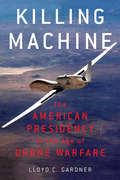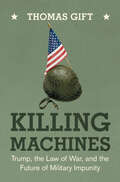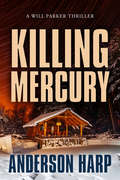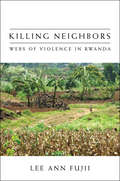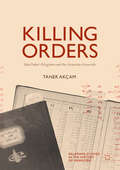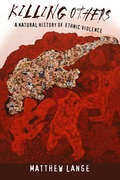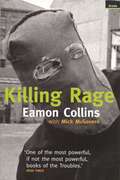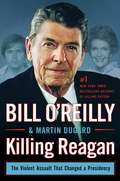- Table View
- List View
Kill or Capture: The War on Terror and the Soul of the Obama Presidency
by Daniel Klaidman&“Divulge[s] the details of top-level deliberations—details that were almost certainly known only to the administration&’s inner circle&” (The Wall Street Journal). When he was elected in 2008, Barack Obama had vowed to close Guantánamo, put an end to coercive interrogation and military tribunals, and restore American principles of justice. Yet by the end of his first term he had backtracked on each of these promises, ramping up the secret war of drone strikes and covert operations. Behind the scenes, wrenching debates between hawks and doves—those who would kill versus those who would capture—repeatedly tested the very core of the president&’s identity, leading many to wonder whether he was at heart an idealist or a ruthless pragmatist. Digging deep into this period of recent history, investigative reporter Daniel Klaidman spoke to dozens of sources to piece together a riveting Washington story packed with revelations. As the president&’s inner circle debated secret programs, new legal frontiers, and the disjuncture between principles and down-and-dirty politics, Obama vacillated, sometimes lashed out, and spoke in lofty tones while approving a mounting toll of assassinations and kinetic-war operations. Klaidman&’s fly-on-the-wall reporting reveals who had his ear, how key national security decisions are really made, and whether or not President Obama lived up to the promise of candidate Obama. &“Fascinating . . . Lays bare the human dimension of the wrenching national security decisions that have to be made.&” —Tina Brown, NPR &“An important book.&” —Steve Coll, The New Yorker
Kill the Fuhrer: Section X and Operation Foxley
by Denis RigdenDuring the Second World War, Britain's top secret Special Operations Executive plotted to assassinate Hitler. A small department of SOE known as Section X had the tantalisingly complex task of investigating how, when and where their plan could be executed. The section also plotted the killing of Goebbels, Himmler and other selected members of Hitler's inner circle. Only Section X and a handful of other SOE staff had any knowledge of these projects, codenamed Operation Foxley and Operation Little Foxleys. As history has shown, these schemes turned out to be pipe dreams. Even so, Section X, renamed the German Directorate in 1944, made a huge contribution to the Allied war effort through their organised sabotage and clandestine distribution of black propaganda. Denis Rigden describes Section X's efforts to discover as much as possible about the intended assassination targets, and questions whether a successful Operation Foxley would have helped or hindered the Allied cause. Based on top secret documents and private sources and illustrated with archive photographs, 'Kill the Fuhrer' is an intriguing insight into the shadowy world of Britain's wartime secret services.
Kill the Ones You Love
by Robert ScottExperience the true crime story of a married father and ex-cop with a dark side in this &“fast-paced, unforgettable real-life thriller&” (Sue Russell).Family On The RunA handsome, married young father and former deputy sheriff, Gabriel Morris looked like the picture of respectability. When his mother and her boyfriend were found brutally murdered in their pleasant Oregon seaside home, authorities were shocked to find a trail leading to him. Soon, police in several states were caught up in a riveting chase as Gabriel, with family in tow, went on a cross-country crime spree. No one knew if his wife, Jessica, was a victim or accomplice; or if his four-year-old daughter was in jeopardy. In a gracious Virginia suburb, a SWAT team swooped down on the renegade family and ended their wild, dangerous ride. What followed was even more shocking, as the story of how Gabriel Morris ended up on the wrong side of the law took investigators on a dark journey into the heart of a killer . . .Includes sixteen pages of dramatic photos.&“Unsettling. . . . While Scott paints a horrifying murder scene, he also efficiently shows how such monsters are made. . . . Unexpected shocks and disturbing surprises.&” —Publishers Weekly
Killdozer: The True Story Of The Colorado Bulldozer Rampage
by Patrick BrowerOn June 4, 2004, Marvin Heeymeyer unleashed his gigantic, armored, tank-like bulldozer upon the small town of Granby, Colorado. It was an act of defiant, but misguided, revenge upon those who he perceived had done him wrong in a long series of local property disputes. Over a period of serveral hours, Heemeyer proceeded to cause mayhem and destruction while overwhelming the efforts of local police to stop the Killdozer in its tracks. This book recounts the events and actions of the perpetrator leading up to the dramatic rampage as well as the aftermath of the horrendous incident in the community.
Killer Apes, Naked Apes, and Just Plain Nasty People: The Misuse and Abuse of Science in Political Discourse
by Richard J. PerryMisunderstood—or deliberately twisted—biological science leads to overheated rhetoric and bad policy.We like to think that science always illuminates. But the disturbing persistence of the concept of biological determinism—the false idea that human behavior is genetically fixed or inherently programmed and therefore is not susceptible to rapid change—shows that scientific research and concepts can be distorted to advance an inhumane and sometimes deadly political agenda. It was biological determinism that formed the basis of the theory of eugenics, which in turn led to the forced sterilization of "misfits" and the creation of Nazi death camps.In Killer Apes, Naked Apes, and Just Plain Nasty People, anthropologist Richard J. Perry delivers a scathing critique of determinism. Exploring the historical context and enduring popularity of the movement over the past century and a half, he debunks the facile and the reductionist thinking of so many popularizers of biological determinism while considering why biological explanations have resonated in ways that serve to justify deeply conservative points of view.Moving through time, from the prevalence of overt racism in the late nineteenth and early twentieth centuries to "human nature" arguments, from the rise of sociobiology in the 1970s to the current fixation on evolutionary psychology, the book argues that both history and cross-cultural studies amply demonstrate the human capacity for growth and self-determination. Clearly written, conversational, and rationally argued, this book promotes sound and careful research while skewering the bogus ideological assertions that have been used to justify colonialism, slavery, gender discrimination, neoliberal economic policies, and the general status quo.
Killer Politics: How Big Money and Bad Politics Are Destroying the Great American Middle Class
by Ed SchultzThe middle class, where the greatness of this nation is rooted, is under siege by an increasingly unethical system, managed by economic vampires who are sucking the lifeblood out of the American family and ripping the heart out of democracy itself. Big money-and the politicians who are swayed by it-play both parties against each other, using this false battle to distract most of us from the real war, which is a war against the American family.This is it, folks . . . the moment of truth. This will be the moment historians will look back upon and either say it was the moment this great ship of state corrected its course, or the moment it sailed completely away from its democratic ideals.To succeed, we have to reach back and rediscover our greatness. Progress may not come as fast as we, in our impatience and impertinence, demand. But if we are patient and persistent, it will come.All good things in life require a heavy lift, so roll up your sleeves. We are not done yet.--from Killer PoliticsAccording to a 2008 Pew Report, more than half of all Americans self-identify as middle class--but the actual number of Americans with middle-class incomes is declining. The middle class is going away. As increasing numbers of Americans are faced with obstacles to education, health care, jobs, and equity, the middle class as a financial bracket is being replaced by the middle class as little more than a state of mind. The richest Americans are growing exponentially wealthier, while the rest of us struggle to bear the financial and emotional burdens of an increasingly broken system.In Killer Politics, Ed Schultz pulls the wool back from our eyes, shows us what the state of the middle class really is, and gives us the tools we need to fight back.
Killer Robots: Legality and Ethicality of Autonomous Weapons
by Armin KrishnanMilitary robots and other, potentially autonomous robotic systems such as unmanned combat air vehicles (UCAVs) and unmanned ground vehicles (UGVs) could soon be introduced to the battlefield. Look further into the future and we may see autonomous micro- and nanorobots armed and deployed in swarms of thousands or even millions. This growing automation of warfare may come to represent a major discontinuity in the history of warfare: humans will first be removed from the battlefield and may one day even be largely excluded from the decision cycle in future high-tech and high-speed robotic warfare. Although the current technological issues will no doubt be overcome, the greatest obstacles to automated weapons on the battlefield are likely to be legal and ethical concerns. Armin Krishnan explores the technological, legal and ethical issues connected to combat robotics, examining both the opportunities and limitations of autonomous weapons. He also proposes solutions to the future regulation of military robotics through international law.
Killer Traitor Spy (John Bailey #4)
by Tim AyliffeSET TO BE ADAPTED FOR THE SCREEN. Journalist John Bailey and CIA officer Ronnie Johnson join forces to outwit their most deadly adversary yet. &‘Ayliffe is a master of the genre.&’ Sulari Gentill STEALING SECRETS IS A DEADLY GAME Someone wants Russian millionaire Dmitry Lebedev dead. After years flying under the radar in Sydney, he&’s just had a narrow escape when a sex worker is poisoned in his hotel room. In desperation he contacts his former CIA case officer, Ronnie Johnson, offering to expose a traitor inside the Australian government in return for protection. John Bailey has spent decades risking his life to break news stories. Along the way he&’s made some interesting friends, including Ronnie — who saved his life in Iraq — and Scarlett Merriman, whose night with Lebedev left her in a coma. And now they both need Bailey&’s help. While Bailey investigates what happened to Scarlett, Ronnie Johnson is calling in an old debt. Because the same people going after Lebedev have framed Ronnie for murder. From Canberra to Moscow to Beijing, Killer Traitor Spy uncovers the new lines of espionage in the twenty-first century. It proclaims Ayliffe as a master of the genre. &‘A carefully crafted, propulsive thriller that sails uncomfortably close to the truth.&’ Michael Brissenden &‘Torn from the headlines and relentlessly paced.&’ Matthew Spencer
Killer Underwear Invasion!: How to Spot Fake News, Disinformation & Conspiracy Theories
by Elise GravelA hilarious and timely tool to help kids learn how to tell what news is true and what isn't. Can peanuts give you super strength? Were unicorns discovered on the moon? Did Martians really invade New Jersey? For anyone who has ever encountered outrageous stories like these and wondered whether they were true, this funny, yet informative book breaks down what fake news is, why people spread it, and how to tell what is true and what isn’t. With quirky illustrations and a humorous tone, Elise Gravel brings her kid-accessible wit to the increasingly important subject of media literacy and equips younger readers with the skills needed to interact with global news. SERIOUSLY FUNNY: While the topic is serious, the funny text and wacky pictures will tickle any reader's funny bone. IMPORTANT: Misinformation and disinformation are everywhere. It is increasingly important that parents and educators help kids learn how to navigate the confusing, modern media landscape. JUST THE FACTS!: Rather than tackle specific news stories, this book teaches kids how to research and judge information in order to make their own decisions about what to believe. BE A GOOD NEIGHBOR: Whether deciding what products to buy, which organizations to support and what scientific information to believe, being a smart media consumer helps keep ourselves and our communities safer. Perfect for:GrandparentsParentsEducatorsLibrarians
Killer in the Kremlin: The instant bestseller - a gripping and explosive account of Vladimir Putin's tyranny
by John SweeneyTHE INSTANT SUNDAY TIMES BESTSELLER - NOW UPDATED WITH FOUR NEW CHAPTERS'This swashbuckling book is a furious attack on the Russian president. Killer in the Kremlin traces Putin's bloody career... a life littered with corpses.' - THE TIMESA gripping and explosive account of Vladimir Putin's tyranny, charting his rise from spy to tsar, exposing the events that led to his invasion of Ukraine and his assault on Europe.In Killer in the Kremlin, award-winning journalist John Sweeney takes readers from the heart of Putin's Russia to the killing fields of Chechnya, to the embattled cities of an invaded Ukraine.In a disturbing exposé of Putin's sinister ambition, Sweeney draws on thirty years of his own reporting - from the Moscow apartment bombings to the atrocities committed by the Russian Army in Chechnya, to the annexation of Crimea and a confrontation with Putin over the shooting down of flight MH17 - to understand the true extent of Putin's long war.Drawing on eyewitness accounts and compelling testimony from those who have suffered at Putin's hand, we see the heroism of the Russian opposition, the bravery of the Ukrainian resistance, and the brutality with which the Kremlin responds to such acts of defiance, assassinating or locking away its critics, and stopping at nothing to achieve its imperialist aims.In the midst of one of the darkest acts of aggression in modern history - Russia's invasion of Ukraine - this book shines a light on Putin's rule and poses urgent questions about how the world must respond.'An extraordinarily prescient and fascinating book.' - NIHAL ARTHANAYAKEInstant Sunday Times bestseller, March 2023
Killing African Americans: Police and Vigilante Violence as a Racial Control Mechanism
by Noel A. CazenaveKilling African Americans examines the pervasive, disproportionate, and persistent police and vigilante killings of African Americans in the United States as a racial control mechanism that sustains the racial control system of systemic racism. Noel A. Cazenave’s well-researched and conceptualized historical sociological study is one of the first books to focus exclusively on those killings and to treat them as political violence. Few issues have received as much conventional and social media attention in the United States over the past few years or have, for decades now, sparked so many protests and so often strained race relations to a near breaking point. Because of both its timely and its enduring relevance, Killing African Americans can reach a large audience composed not only of students and scholars, but also of Movement for Black Lives activists, politicians, public policy analysts, concerned police officers and other criminal justice professionals, and anyone else eager to better understand this American nightmare and its solutions from a progressive and informed African American perspective.
Killing Christians: Living the Faith Where It's Not Safe to Believe
by Tom DoyleCould you retain your faith even if it meant losing your life? Your family&’s lives? To many Christians in the Middle East today, a &“momentary, light affliction&” means enduring only torture instead of martyrdom. The depth of oppression Jesus followers suffer is unimaginable to most Western Christians. Yet, it is an everyday reality for those who choose faith over survival in Syria, Iran, Egypt, Lebanon, and other countries hostile to the Gospel of Christ. InKilling Christians, Tom Doyle takes readers to the secret meetings, the torture rooms, the grim prisons, and even the executions that are the &“calling&” of countless Muslims-turned-Christians. Each survivor longs to share with brothers and sisters &“on the outside&” what Christ has taught them. Killing Christians is their message to readers who still enjoy freedom to practice their faith. None would wish their pain and suffering on those who do not have to brave such misery, but the richness gained through their remarkable trials are delivered—often in their own words—through this book. The stories are breathtaking, the lessons soul-stirring and renewing. Killing Christians presents the dead serious work of expanding and maintaining the Faith.
Killing Detente: The Right Attacks the CIA
by Anne CahnKilling Detente tells the story of a major episode of intelligence intervention in politics in the mid-1970s that led to the derailing of detente between the Soviet Union and the United States and to the resurgence of the Cold War in the following decade. Although the basic outlines of the story are already known, Anne Cahn succeeded in getting many previously declassified documents released and uses these, supplemented by seventy interviews with principal players, to add much greater depth and detail to our understanding of this troubling event in U. S. history.In the mid-1970s a very controversial intelligence estimate was performed by people outside the government. They were given access to our most secret files and leaked their report to the press when Jimmy Carter was elected president. This study, which became known as "The Team B Report," became the intellectual forbearer of the "window of vulnerability" and led to the demise of detente between the Soviet Union and the United States. Team B was the fundamental turning point in renewing the Cold War in the 1980s. The debate over the leaked report moved the center of arms control policy strongly to the right from where it had been during the years of detente. Team B presaged the triumph of Ronald Reagan and a military buildup on a scale unprecedented in peacetime that left present and future generations with the most crippling debt in our nation’s history. This book is about attempts to destroy improved relations between the United States and the Soviet Union in the 1970s. Those opposed to the easing of tensions between the two countries used every means available, including accusing the Central Intelligence Agency of understating the threat posed by the Soviets. Charging the CIA this way seems preposterous now.
Killing Detente: The Right Attacks the CIA
by Anne CahnKilling Detente tells the story of a major episode of intelligence intervention in politics in the mid-1970s that led to the derailing of detente between the Soviet Union and the United States and to the resurgence of the Cold War in the following decade. Although the basic outlines of the story are already known, Anne Cahn succeeded in getting many previously declassified documents released and uses these, supplemented by seventy interviews with principal players, to add much greater depth and detail to our understanding of this troubling event in U. S. history.In the mid-1970s a very controversial intelligence estimate was performed by people outside the government. They were given access to our most secret files and leaked their report to the press when Jimmy Carter was elected president. This study, which became known as "The Team B Report," became the intellectual forbearer of the "window of vulnerability" and led to the demise of detente between the Soviet Union and the United States. Team B was the fundamental turning point in renewing the Cold War in the 1980s. The debate over the leaked report moved the center of arms control policy strongly to the right from where it had been during the years of detente. Team B presaged the triumph of Ronald Reagan and a military buildup on a scale unprecedented in peacetime that left present and future generations with the most crippling debt in our nation’s history. This book is about attempts to destroy improved relations between the United States and the Soviet Union in the 1970s. Those opposed to the easing of tensions between the two countries used every means available, including accusing the Central Intelligence Agency of understating the threat posed by the Soviets. Charging the CIA this way seems preposterous now.
Killing Eve: The Basis For Killing Eve (Killing Eve #2)
by Luke JenningsEve and Villanelle plan for a high-stakes showdown in this sophisticated follow-up to the spy thriller that inspired the hit TV series Killing Eve."If you want us to remain silent -- if you want to retain your freedom, your job, and your reputation -- you need to tell us everything, and I mean everything. . ."We last saw Eve and Villanelle in a spy vs. spy race around the world, crossing powerful criminal organizations and dangerous governments, each trying to come out on top. But they aren't finished yet.In this sequel to Killing Eve: Codename Villanelle, former M16 operative Eve reveals a new side to her strengths, while coming ever closer to a confrontation with Villanelle, the evasive and skilled assassin.
Killing Kennedy: Exposing the Plot, the Cover-Up, and the Consequences
by Jack RothStartling new insights into the JFK assassination In Killing Kennedy: Exposing the Plot, the Cover-Up, and the Consequences, author Jack Roth interviews researchers, scholars, eyewitnesses, and family members of those who were part of the tangled web of US intelligence operations associated with the Cold War and the circumstances surrounding the assassination of John F. Kennedy. The author asks important questions, including why the assassination still matters today and what the lasting ripple effects have been since that fateful day. The Kennedy assassination represents one of the most impactful events in not only American but also world history, and this book represents an important addendum to understanding its enduring significance. On November 22, 1963, the duly elected president of the United States was murdered in cold blood, forever destroying &“Camelot&” and national optimism for world peace. Gleaning a &“people&’s history&” of the assassination through dozens of insightful and heartfelt interviews, Roth presents a riveting narrative by creating a respectful, well-crafted, and emotionally charged book from which both older and younger generations will gain a greater understanding of our nation&’s history and current status in the modern world.
Killing Machine
by Lloyd C. GardnerWith Obama's election to the presidency in 2008, many believed the United States had entered a new era: Obama came into office with high expectations that he would end the war in Iraq and initiate a new foreign policy that would reestablish American values and the United States' leadership role in the world.In this shattering new assessment, historian Lloyd C. Gardner argues that, despite cosmetic changes, Obama has simply built on the expanding power base of presidential power that reaches back across decades and through multiple administrations.The new president ended the "enhanced interrogation" policy of the Bush administration but did not abandon the concept of preemption. Obama withdrew from Iraq but has institutionalized drone warfare--including the White House's central role in selecting targets. What has come into view, Gardner argues, is the new face of American presidential power: high-tech, secretive, global, and lethal.Killing Machine skillfully narrates the drawdown in Iraq, the counterinsurgency warfare in Afghanistan, the rise of the use of drones, and targeted assassinations from al-Awlaki to Bin Laden--drawing from the words of key players in these actions as well as their major public critics. With unparalleled historical perspective, Gardner's book is the new touchstone for understanding not only the Obama administration but the American presidency itself.
Killing Machines: Trump, the Law of War, and the Future of Military Impunity
by Thomas GiftWhat causes a Western democratic leader to stop even feigning to value the law of war? Unlike past US presidents, who at least paid lip service to the law of armed conflict, Donald Trump has openly flouted it: pardoning war criminals; denigrating the Geneva Conventions; praising torture; and discarding military norms of restraint. This gripping account depicts how Trump has upended assumptions about America's outward commitment to the law of war, exposing the conditions that make such defiance possible. Drawing on in-depth case studies and original survey analysis, Thomas Gift explains how Trump has relied on right-wing media and allies in Congress to attack the law of war – not in the shadows, but in broad daylight. Killing Machines cautions that Trump's approach is not an aberration – it's a playbook other leaders could follow. This title is also available as Open Access on Cambridge Core.
Killing Mercury (A Will Parker Thriller #5)
by Anderson HarpCODE RED Decorated Marine lieutenant colonel and small-town Georgia D.A. Will Parker has nothing to do with the outgoing U.S. President or his administration, including the secret service. And that&’s the way he wants to keep it. But Will&’s about to get in deep, whether he likes it or not. With two terms behind him, President Prisock Jordan is leaving the White House. And his daughter, Elizabeth, a student at Harvard, couldn&’t be happier. She&’s even planned a ski trip in hopes of ditching her secret-service detail, which calls her by a code name: Mercury. But a terrorist has different ideas. Injured in the president&’s last drone strike on the outskirts of a Yemen city, Hamza Bin Laden is on Mercury&’s trail—with the help of social media and a Russian hacker. When a Marine major and confidante of Elizabeth&’s learns that Hamza may be in the U.S., he fears for her life. With Elizabeth suddenly incommunicado, he requisitions an F-16 and flies to Georgia to beg for help—discreet help—from a reluctant Will Parker. But with a shocking turn of events, the threat level quickly skyrockets, forcing Will to deal with a secret service who won&’t listen to him. For only Will has the clues to Mercury&’s true location. And when a terrorist cell murders a group of college students in a remote cabin, it&’s up to Will and one bright and brave survivor to make their way across treacherous, foreign terrain to get to Mercury—before Hamza does . . . Praise for RETRIBUTION &“Tense and authentic—reading this book is like living a real life mission.&”—Lee Child &“I seldom come across a thriller as authentic and well?written as Retribution. Andy Harp brings his considerable military expertise to a global plot that&’s exciting, timely, and believable . . . to say that I&’m impressed is an understatement.&” —David Morrell, New York Times bestselling author of The Protector &“Retribution is a stunner: a blow to the gut and shot of adrenaline. Here is a novel written with authentic authority and bears shocking relevance to the dangers of today. It reminds me of Tom Clancy at his finest.&” —James Rollins, New York Times bestselling author of Bloodline &“Outstanding thriller with vivid characters, breakneck pacing, and suspense enough for even the most demanding reader. Harp writes with complete authenticity and a tremendous depth of military knowledge. A fantastic read—don&’t miss it!&” —Douglas Preston, #1 bestselling author of Impact
Killing Mercury (A Will Parker Thriller #5)
by Anderson HarpCODE RED Decorated Marine lieutenant colonel and small-town Georgia D.A. Will Parker has nothing to do with the outgoing U.S. President or his administration, including the secret service. And that&’s the way he wants to keep it. But Will&’s about to get in deep, whether he likes it or not. With two terms behind him, President Prisock Jordan is leaving the White House. And his daughter, Elizabeth, a student at Harvard, couldn&’t be happier. She&’s even planned a ski trip in hopes of ditching her secret-service detail, which calls her by a code name: Mercury. But a terrorist has different ideas. Injured in the president&’s last drone strike on the outskirts of a Yemen city, Hamza Bin Laden is on Mercury&’s trail—with the help of social media and a Russian hacker. When a Marine major and confidante of Elizabeth&’s learns that Hamza may be in the U.S., he fears for her life. With Elizabeth suddenly incommunicado, he requisitions an F-16 and flies to Georgia to beg for help—discreet help—from a reluctant Will Parker. But with a shocking turn of events, the threat level quickly skyrockets, forcing Will to deal with a secret service who won&’t listen to him. For only Will has the clues to Mercury&’s true location. And when a terrorist cell murders a group of college students in a remote cabin, it&’s up to Will and one bright and brave survivor to make their way across treacherous, foreign terrain to get to Mercury—before Hamza does . . . Praise for RETRIBUTION &“Tense and authentic—reading this book is like living a real life mission.&”—Lee Child &“I seldom come across a thriller as authentic and well?written as Retribution. Andy Harp brings his considerable military expertise to a global plot that&’s exciting, timely, and believable . . . to say that I&’m impressed is an understatement.&” —David Morrell, New York Times bestselling author of The Protector &“Retribution is a stunner: a blow to the gut and shot of adrenaline. Here is a novel written with authentic authority and bears shocking relevance to the dangers of today. It reminds me of Tom Clancy at his finest.&” —James Rollins, New York Times bestselling author of Bloodline &“Outstanding thriller with vivid characters, breakneck pacing, and suspense enough for even the most demanding reader. Harp writes with complete authenticity and a tremendous depth of military knowledge. A fantastic read—don&’t miss it!&” —Douglas Preston, #1 bestselling author of Impact
Killing Neighbors: Webs of Violence in Rwanda
by Lee Ann FujiiIn the horrific events of the mid-1990s in Rwanda, tens of thousands of Hutu killed their Tutsi friends, neighbors, even family members. That ghastly violence has overshadowed a fact almost as noteworthy: that hundreds of thousands of Hutu killed no one. In a transformative revisiting of the motives behind and specific contexts surrounding the Rwandan genocide, Lee Ann Fujii focuses on individual actions rather than sweeping categories. Fujii argues that ethnic hatred and fear do not satisfactorily explain the mobilization of Rwandans one against another. Extensive interviews in Rwandan prisons and two rural communities from the basics for her claim that mass participation in the genocide was not the result of ethnic antagonisms. Rather, the social context of action was critical. Book jacket.
Killing Orders: Talat Pasha’s Telegrams and the Armenian Genocide (Palgrave Studies in the History of Genocide)
by Taner AkçamThe book represents an earthquake in genocide studies, particularly in the field of Armenian Genocide research. A unique feature of the Armenian Genocide has been the long-standing efforts of successive Turkish governments to deny its historicity and to hide the documentary evidencesurrounding it. This book provides a major clarification of the often blurred lines between facts and truth in regard to these events. The authenticity of the killing orders signed by Ottoman Interior Minister Talat Pasha and the memoirs of the Ottoman bureaucrat Naim Efendi have been two of the most contested topics in this regard. The denialist school has long argued that these documents and memoirs were all forgeries, produced by Armenians to further their claims. Taner Akçam provides the evidence to refute the basis of these claims and demonstrates clearly why the documents can be trusted as authentic, revealing the genocidal intent of the Ottoman-Turkish government towards its Armenian population. As such, this work removes a cornerstone from the denialist edifice, and further establishes the historicity of the Armenian Genocide.
Killing Others: A Natural History of Ethnic Violence
by Matthew LangeIn Killing Others, Matthew Lange explores why humans ruthlessly attack and kill people from other ethnic communities. Drawing on an array of cases from around the world and insight from a variety of disciplines, Lange provides a simple yet powerful explanation that pinpoints the influential role of modernity in the growing global prevalence of ethnic violence over the past two hundred years. He offers evidence that a modern ethnic mind-set is the ultimate and most influential cause of ethnic violence. Throughout most of human history, people perceived and valued small sets of known acquaintances and did not identify with ethnicities. Through education, state policy, and other means, modernity ultimately created broad ethnic consciousnesses that led to emotional prejudice, whereby people focus negative emotions on entire ethnic categories, and ethnic obligation, which pushes people to attack Others for the sake of their ethnicity. Modern social transformations also provided a variety of organizational resources that put these motives into action, thereby allowing ethnic violence to emerge as a modern menace. Yet modernity takes many forms and is not constant, and past trends in ethnic violence are presently transforming. Over the past seventy years, the earliest modernizers have transformed from champions of ethnic violence into leaders of intercommunal peace, and Killing Others offers evidence that the emergence of robust rights-based democracy—in combination with effective states and economic development—weakened the motives and resources that commonly promote ethnic violence.
Killing Rage
by Eamon Collins Mick McgovernSince the 1970s, people have been murdering their neighbors in Northern Ireland. This book is the true account of the small-town violence and terror which lies behind the headlines.
Killing Reagan: The Violent Assault That Changed a Presidency
by Bill O'Reilly Martin DugardFrom the bestselling team of Bill O'Reilly and Martin Dugard comes Killing Reagan, a page-turning epic account of the career of President Ronald Reagan that tells the vivid story of his rise to power -- and the forces of evil that conspired to bring him down.<P><P> Just two months into his presidency, Ronald Reagan lay near death after a gunman's bullet came within inches of his heart. His recovery was nothing short of remarkable -- or so it seemed. But Reagan was grievously injured, forcing him to encounter a challenge that few men ever face. Could he silently overcome his traumatic experience while at the same time carrying out the duties of the most powerful man in the world? <P> Told in the same riveting fashion as Killing Lincoln, Killing Kennedy, Killing Jesus, and Killing Patton, Killing Reagan reaches back to the golden days of Hollywood, where Reagan found both fame and heartbreak, up through the years in the California governor's mansion, and finally to the White House, where he presided over boom years and the fall of the Iron Curtain. But it was John Hinckley Jr.'s attack on him that precipitated President Reagan's most heroic actions. In Killing Reagan, O'Reilly and Dugard take readers behind the scenes, creating an unforgettable portrait of a great man operating in violent times.
